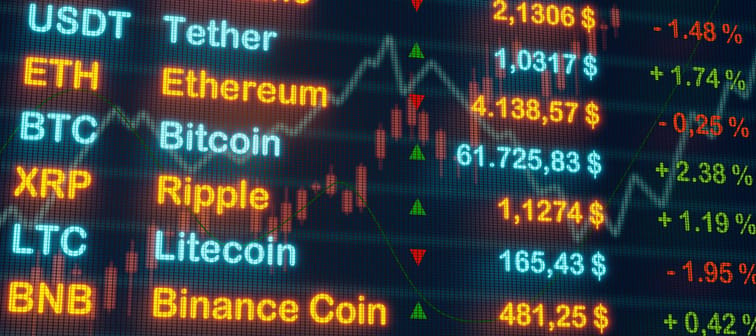What are stablecoins?
Stablecoins are cryptocurrencies that are typically backed by reserve assets, like the U.S. dollar or precious metals, although some are backed by less tangible assets. When you buy a stablecoin, you more or less know that you will be able to sell it for the same amount of that asset as what you bought it for.
Stablecoins come in four varieties:
-
Fiat-backed stablecoins are tied to fiat currencies, like the U.S. dollar, at a 1-to-1 ratio. Tether, TrueUSD and Gemini Dollar are all examples. For instance, on Jan. 10, the value of the Gemini Dollar ranged between US$0.9967 and US$1.0000.
-
Commodity-backed stablecoins’ value is preserved by commodities that can be traded on a public market. Most are backed by gold, like Digix Gold, Tether Gold and Universal Gold. On Jan. 10, when the price of gold was hovering around US$1,800 an ounce, a single Tether Gold token was worth US$1,803.
-
Non-collateralized stablecoins aren’t backed by an asset. Instead, algorithms adjust the supply of these coins to prevent them from spiking or dropping in value. Carbon and Reserve are two of the most well-known non-collateralized stablecoins.
-
Crypto-backed stablecoins are backed by other cryptocurrencies, typically more prominent ones like Bitcoin and Ethereum. Because the assets backing these stablecoins are themselves fairly volatile, crypto-backed stablecoins are the least stable of the bunch. Dai, which pegs its value to Ethereum, is one of the most prominent examples.
By purchasing a stablecoin, you’re more or less storing your money in the asset behind it, not making a bet that the coin itself will increase in value. That’s not what stablecoins are designed to do.
A better online investing experience
Easy to use and powerful, Qtrade's online trading platform puts you in full control with tools and resources that help you make well-informed decisions.
Invest NowSo what’s the point of buying stablecoins?
You might be wondering why someone wouldn’t just buy gold or U.S. dollars in the first place and save the time and hassle of purchasing stablecoins through a crypto exchange. In terms of securing either asset for a long-term hold, you may indeed be better off cutting stablecoins out of the equation.
Stablecoins, as far as crypto assets go, are primarily valued for their convenience. They were created to be a simple, easily transferable alternative to more volatile cryptocurrencies, and have made processes like sending international remittances or completing recurring payments through a blockchain network more secure and less fee-intensive. Crypto exchanges that aren’t allowed to swap Bitcoin for fiat dollars often allow users to exchange their un-stablecoins for stablecoins instead.
A spokesperson at cryptocurrency exchange Coinbase says that ease of use has turned stablecoins like USD Coin into some of the most popular ways to store and trade value in the crypto ecosystem. Billions of dollars continue to flow into stablecoins everyday.
“If it really and truly is stable — I believe that you believe that everybody believes it will maintain its value — you can start to do things with it,” says Len Zapalowski, senior advisor at boutique investment bank Strategic Exits, “because people trust the fact that if I pay you for something with a stablecoin, the value will not change.”
But trust is becoming an issue for the stablecoin market.
Rocky days ahead?
Some of Bitcoin’s most recent nosedives came after various governments, including China’s and the U.S.’s, either made moves or comments that hinted at increased regulation of the crypto market.
The regulation conversation is expanding to include stablecoins.
“Stablecoins that are well-designed and subject to appropriate oversight have the potential to support beneficial payments options. But the absence of appropriate oversight presents risks to users and the broader system,” U.S. Treasury Secretary Janet Yellen said in a November statement.
The predominant risk to consumers is not knowing whether the entities providing stablecoins actually have the assets on hand to back their customers’ purchases. Harvard Senior Fellow Timothy G. Massad says there are “no standards requiring issuers to protect reserves or maintain liquidity.”
Tether was recently punished for not being able to prove it possesses enough currency to back the US$69 billion in coins the company sold to investors. The Commodity Futures Trading Commission fined the company US$41 million for the oversight.
“This is the key thing: if you’re going to get involved in stablecoins, you need to understand whether there’s transparency in the collateral,” Zapalowski warns.
But some, like Yellen, feel stablecoins could play a role in not only disrupting the global financial system, but society as a whole.
“Stablecoins also pose illicit finance concerns and risks to financial integrity, including concerns related to compliance with rules governing anti-money laundering and countering the financing of terrorism and proliferation,” she said.
The value of stablecoins has, naturally, not dropped amidst the controversy, but depending on how stablecoin providers react to calls for more stringent regulation, the coins’ usefulness could take a hit, making them even less appealing to their core users — those already active in the crypto investment space.
Trade Smarter, Today
Build your own investment portfolio with the CIBC Investor's Edge online and mobile trading platform and enjoy low commissions. Get 100 free trades and $200 or more cash back until March 31, 2025.







